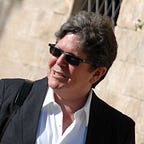Journalists Love a Free Press — Until They are Actually Confronted With One
Elon Musk’s vision of Twitter is a truly open platform — a ‘town square’ where people can say whatever they like.
This is the essence of a Free Press. Yet this vision sends a wave of terror through the journalism community.
Journalists love to champion “Free Press,” that is, until they are actually confronted with one. Then, it terrifies them.
Up until now, we have not really had a Free Press. As HL Mencken wrote in 1961, “truly freedom of the press is reserved for those who own one.” And that was certainly the case in 1961, when there was a free press for the Sulzberger family, owners of The NY Times, or the Chandler family, owners of The LA Times, or the Meyer family, owners of The Washington Post. They were free to publish whatever they liked.
There was a free press for the Paley family, owners of CBS, or the Goldensohns, owners of ABC, or the Sarnoffs (later GE then Comcast), owners of NBC. Yes, they were certainly free to broadcast what they believed appropriate. Oh yeah, and then there was Rupert Murdoch.
For the rest of us, our part in the world of the Free Press was the right to read one of those newspapers or to watch one of those networks. We were free to choose which power group we wanted to listen to. That was not a free press.
With the exception of the ‘letters to the editor’ part of the newspaper (and who decided which letters got printed?), the ‘voice of the people’ was not to be heard.
When I was teaching at NYU, I used to tell my journalism students to shoot a story on a video camera and take it over to WCBS to see if they would air it. Time after time they were simply asked to leave the building by the security people who looked at them as if they were crazy.
TV news is not for you! It’s for Katie Couric. What is the matter with you?
But the Media are the children of technology. Technology creates the media, not the other way around. So there were no books until Gutenberg’s invention democratized book printing. There was no radio until Marconi. There was no television until John Logie Baird and his pals invented it. Then, in 2007, Steve Jobs gave us the iPhone and Tim Berners Lee brought us the world wide web. Then, suddenly, all the barriers to a free press were blown away.
You no longer needed to own a newspaper to publish your opinions. You no longer needed to own a TV network and an FCC license or have a cable system to publish your ideas. Now that is a revolution.
And what happened?
A truly free press. For the first time.
And how did journalists respond?
“What Musk seemingly fails to recognize is that to truly have free speech today, you need moderation,” said Katie Harbath, a former Facebook public policy director and CEO of consultancy Anchor Change.”
Oh really?
And who gets to be the ‘moderator’?
In Russian, Putin has decided that he will be the ‘moderator’. And he is doing a great job of moderating. Who decides who is the ‘moderator’? And where in the First Amendment is there any mention of a ‘moderator’?
During the American Revolution, the British would have loved to have ‘moderated’ the American press — See Benjamin Franklin, newspaper publisher calling for Revolution.
Our first exposure to a free press was Gutenberg’s printing press, which suddenly allowed anyone to publish whatever they liked. And what happened? Martin Luther started to publish hate speech against the Pope! Well, that made a lot of people very unhappy and the Pope and a lot of European monarchs tried very hard to ‘moderate’ the new free press. A lot of that ‘moderation’ came in the form of public burnings of heritics.
Yeah, a free press is messy. It is supposed to be. That’s the whole idea.
Messy can be upsetting.
It is also supposed to be.
As Justice Louis Brandeis wrote: “The best remedy for bad free speech is more free speech.” Likewise with a free press.
It’s not a perfect solution, but it’s a whole lot better than ‘moderators’ deciding who can say what.
